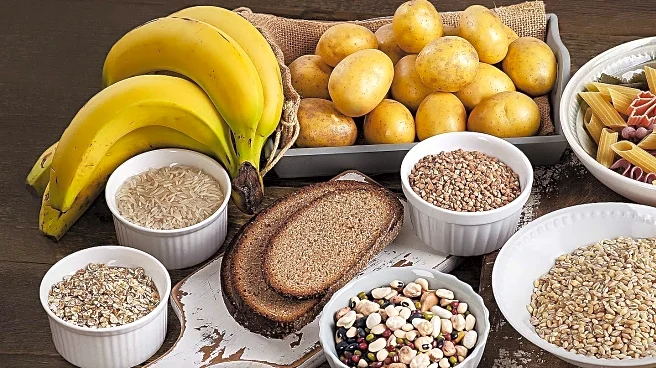What is the story about?
What's Happening?
Karen Corbin, an associate investigator at the AdventHealth Translational Research Institute of Metabolism and Diabetes, emphasizes the importance of a fiber-rich diet for maintaining a healthy gut microbiome. According to Corbin, the gut microbiome, consisting of trillions of microbes, plays a crucial role in long-term health. Consuming foods high in fiber, particularly resistant starch, can lead to the production of beneficial compounds that protect and improve health. Conversely, a diet high in ultra-processed foods can lead to inflammation and increase the risk of chronic diseases. Corbin suggests simple dietary upgrades, such as switching from low-fiber to high-fiber foods, to support gut health.
Why It's Important?
The focus on fiber-rich diets is significant as it addresses the growing concern over chronic diseases linked to poor dietary habits. By promoting the consumption of fiber, particularly resistant starch, individuals can potentially reduce inflammation and lower the risk of conditions such as obesity, Type 2 diabetes, and heart disease. This dietary approach not only supports gut health but also contributes to overall well-being by regulating blood sugar levels and promoting satiety. The emphasis on reducing ultra-processed foods aligns with broader public health initiatives aimed at improving dietary quality and reducing healthcare costs associated with diet-related diseases.
What's Next?
As awareness of the benefits of a fiber-rich diet grows, it is likely that more individuals will seek to incorporate these dietary changes into their daily routines. Health professionals and nutritionists may increasingly advocate for these dietary adjustments as part of preventive health strategies. Additionally, food manufacturers might respond by developing and marketing products that are higher in fiber and less processed, catering to the demand for healthier food options. Public health campaigns could further emphasize the importance of dietary fiber, potentially influencing policy changes to support healthier eating habits.
Beyond the Headlines
The shift towards a fiber-rich diet also raises questions about food accessibility and affordability. Ensuring that all individuals have access to high-quality, fiber-rich foods is crucial for equitable health outcomes. Moreover, the cultural and culinary implications of dietary changes should be considered, as traditional diets may need to be adapted to incorporate more fiber without losing cultural significance. The long-term impact of these dietary shifts on food production and agricultural practices could also be significant, potentially leading to increased demand for certain crops and changes in farming practices.














